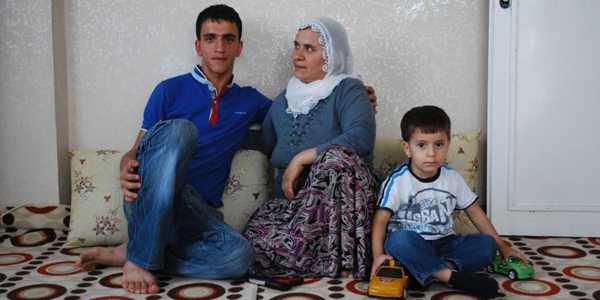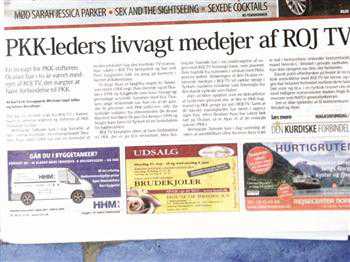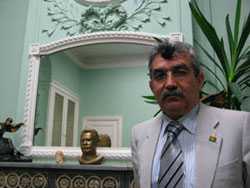Jenna Krajeski – Jenna Krajeski is a journalist based in Istanbul. Her previous work has appeared in Al-Masry Al-Youm, The New Yorker, Slate, The World Policy Journal, Bidoun, The San Francisco Chronicle and elsewhere.
By Jenna Krajeski
Oct 6 2011, 8:16 AM ET “With this Kurdish issue, there are two ways of struggling: with weapons or with politics. I chose politics because war never ends.”

Ferman, his mother, and her son in Turkey / Jenna Krajeski
DIYARBAKIR, Turkey — On July 14, 2008, Diyarbakir, a majority Kurdish city in southeast Turkey, erupted in protests. Abdullah Ocalan, the imprisoned founder of the Kurdistan Workers Party (PKK), had been forced to cut his hair, and men and women in the city, angered by what they saw as a humiliation of their leader, chopped their own hair and gathered in Kosuyblu Park. Among them were two 15-year-old boys, Mazlon and Ferman (his name has been changed). When police began spraying tear gas, the boys threw rocks and were arrested.
At the same time, an assembly had been called to remember the prisoners who had died in 1982 during a hunger strike in nearby Diyarbakir prison. Hawar (also not his real name), age 15, stopped to listen on his way home from working as a cell-phone salesman. When he turned to leave, he was blocked by a line of police, who began spraying the crowd with tear gas and water cannons. Hawar felt trapped. “There were only stones, so I threw a stone.” He was arrested.
Their stories converged in Diyarbakir prison, where the three boys were accused of terrorism. For almost a year, the boys shared a cell, and became close friends.
I met Hawar’s father, Arif, for breakfast in Diyarbakir. A small man with a gray mustache and two pens clipped neatly to the inside of his shirt pocket, Arif spoke adamantly about the stone-throwing kids, a cause he has taken up since Hawar’s arrest. He tells the story of the arrest with determined, slow speech–bored with the familiar narrative, still stunned by the details.
When Hawar wasn’t home by 11 p.m., Arif started to worry. He called police stations, looking for him. “If he was in a hospital, I would have gotten information right away. If there is no news, it means he is arrested.”
Arif, like the three boys, was unaware that in 2006 Turkey had tightened its anti-terror laws and that juveniles could now be tried as adults. When he realized that his son could be in prison for years, “It was like volcanoes were exploding inside me,” he said. “There was nothing I could do for him.”
Arif’s retelling, though thick with residual fear, included some optimism. Hawar’s prison term–ten months and eight days–was comparatively short and since then, he’s been doing well. Later that day, from a plush arm chair below framed photos of himself and his two brothers, Hawar narrated his own imprisonment.
“They arrested us and put us in the back of the police car. They beat us and swore at us. Then they took us to the hospital, where doctors examined us, supposedly for evidence of torture. They did not record our bruises. ‘Their’ doctors didn’t care about us.”
Being unaware of the severity of the charges against him, each day in prison was a new shock to Hawar. But nothing compared to the shock of the sentence itself: 38 years. “When I saw the 38 years, I thought I have to get used to living my life in prison.”
It was a life that included a 7 a.m. head count followed by an “inedible” breakfast, reading books or beading bracelets, then to the small courtyard for his “right to breathe,” then lunch. After lunch they read some more, and in the evening they were given the day’s newspapers. Hawar, Mazlon, and Ferman favored the more independent Taraf and Radikal, “The best of the worst.” There were no Kurdish news sources allowed. “They were doing their best to close our eyes to the world,” Hawar told me.
But, in spite of the harsh sentence, Hawar found himself more determined. “Before prison I was not interested in finishing school,” he said. “But then I saw the unfairness in this country and decided I wanted to do something. With this Kurdish issue, there are two ways of struggling: with weapons or with politics. I chose politics because war never ends.” In June, Hawar will take the university entrance exam. He plans to become a human rights lawyer.
In prison, Hawar was comforted by the presence of his two friends, but began to worry about Mazlon. The boy had always been cheerful, smiling and making jokes. At first, Mazlon spent his time beading colorful bracelets he would then give to his family when they visited. But he was becoming quickly more radicalized. “When we were talking about resistance, he would say that the only way to fight was with weapons,” Hawar said.
When he was released, like Hawar after ten months and eight days, Mazlon worked as a photographer for a Kurdish newspaper. Because his daily life consisted of documenting protests and funerals–“He told his mother that he cannot be more impassioned about the Kurdish cause than when he was photographing bodies being put in the ground,” Hawar said–Mazlon could not put his jail time behind him. A year after his release, he joined Kurdish guerilla forces in the mountains, and soon after that was killed.
“Mazlon was 100 percent changed by prison,” Hawar said. “There was no education and no justice.”
Across town, Ferman’s mother, Welat, sat on the floor of her living room, leaning against a pillow and playing absentmindedly with her 2-year-old son and 1-year-old grandson.”When Ferman heard that Mazlon was killed, he stopped eating. He went to his memorial and fainted three or four times,” she said. “They were in the same cell. They were very close.”
Half-watching Kurdish Roj TV’s tribute to a recently killed guerilla–15 minutes of stills and interviews set among strikingly isolated mountain ranges–Welat tearfully predicted her son’s future. “If it is not finished now, the youngest generation will never stop fighting.” Ferman, who served more than two years in prison, had been noticeably more agitated since his release, but after Mazlon’s death, she was having a hard time reaching him at all. The sleeping pills and anti-anxiety medication given to him by a human rights organization in Diyarbakir had stopped working, and he was now refusing to go to the therapy sessions offered by the same organization. He would not enroll in school, two years behind his former classmates, and he followed news related to the Kurdish issue obsessively. “If he is surrounded by bad things, how can he get better?” she wondered.
Ferman entered the apartment–a clean but sparse place located in Baglar, a neighborhood known for its violent protests–complaining of a headache. He had spent the day selling watermelons at his father’s fruit stand, a job he goes to every day but which his mother says he can only withstand for a couple of hours at a time. The tall boy sat fiddling with his cell phone and politely answering (and often politely refusing to answer) my questions.
“It was bad being in prison. That period was bad. It was like the period of torture in the 90s,” he said, referring to a 1996 incident in Diyarbakir prison in which ten prisoners were beaten to death. “I was in isolation on the first day, and, I don’t know if it was real or not, but I was hearing soldiers shouting. I remembered what happened in the 90s in that prison and I found myself feeling that I was in those years. Now I can’t sleep. When I try I dream about what I faced when I was arrested.”
I asked how he was feeling, and he said, “So-so.” I asked why he wasn’t feeling good, he waved his hands, saying vaguely, “Because of some events.”
He did tell me about his early medical treatment in the prison. Jabbing his thumb into his rib cage, he described how he had trouble breathing during the first days. He was frightened and went to the prison doctors. “When they saw me, they said, ‘Ah, here comes the terrorist.’”
The word stuck. “Being called a terrorist reminded me of the political prisoners, who they also called terrorists. It reminded me of the guerillas. It gave me an identity.”






